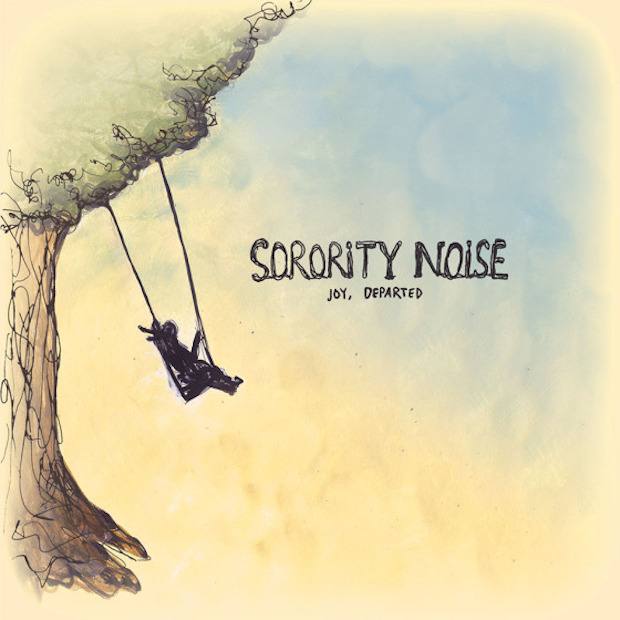This is a horribly reductive statement, and it includes a whole pile of classic exceptions, but I'm going to make it anyway: Emo, for the long duration of its commercial peak, was an entire genre made up of dudes who were sad and who blamed that sadness on the girls who'd broken up with them and/or cheated on them. There's a great Jessica Hopper Punk Planet piece from that era about how the entire scene, through lyrics and actions, denied women their agency even though every fucking song was about women. What had started out as an optimistic genre -- a way out of the rigorous rut of hardcore pummel, a new avenue for self-expression -- had become a repository for the sort of dumped-chump heart-baring that belonged on LiveJournal rather than in song. What's most interesting about Joy, Departed, the sophomore album from the Connecticut band Sorority Noise, is the way it flirts with that old viewpoint while ultimately transcending it. There's a lot of breakup talk on Joy, Departed, and a light sprinkling of how-could-you-do-this-to-me blame-talk. But the album ultimately isn't about that. It's about addiction and manic depression, about realizing that you need to address the things you've got going on in your own head before you can even think about sharing your life with another person. Frontman Cameron Boucher is never really in accusatory ex-boyfriend mode, though he does spend some time longing for someone who he's not going to have. But when self-help-book verbiage starts creeping into his lyrics, his voice takes on a whole new urgency. He's singing from the perspective of someone who's damaged and -- here's a key distinction -- who knows he's damaged. That level of insight, combined with some seriously great keyed-up pop-punk hookery, makes Joy, Departed the best thing I've heard from the so-called emo-revival since that became a music-press buzz-term a couple of years ago.
Joy, Departed is structured like a slow epiphany. The parts where Boucher is singing to some nameless heartbreaker lady all come early in the album, as though those feelings are a phase he's working through. And even there, he's singing from a place of hopelessness, not anger: "Why do I still compare everyone that I love to the way that I loved you?" He's pining for someone, and if he ends up being the one she settles for, that's cool with him: "I will never be the turning of your leaves / I just hope to be the one you call when you can't sleep." That's not romantic; it's pathetic, and I think Boucher knows it. And the whole idea of a relationship is a motivator for him, a reason to keep himself somewhat functional: "I know you'll never love me, but I pretend that you love me / You'll always be the reason I stay clean." A few songs later, after he's been working on himself for a while, Boucher sings, "I stopped wishing I was dead / Learned to love myself before anyone else / Became more than just a burden / I know I'm more than worthy of your time." But that's the same song, "Using," where he opens up by confessing that he started using again. He's making progress, but he's fucking up, too. He questions himself and the steps that he's taken. And he ends it all with "When I See You (Timberwolf)," a song about a friend who went through the same things as he did and who didn't make it through to the other side: "You smell like hospitals / And you look like bad news / And if God is real / I hope he has a plan for you / If the devil is real / Let him know I asked how he's been / Because when I rid myself of my demons / They must have found a home in you." There but for the grace of God goes Boucher.
This is sad, heavy music, and it's emotionally real in a way that most emo could not be. By the end of the album, you get the idea that Boucher might think he's reached a better place but that he's pretty much still in the woods. And it's not just a therapy session in song form or a half-hour punk rock sadness tantrum. Sorority Noise's first album was last year's Forgettable, and it was about a lot of the same feelings. It was a good album -- hard and zippy and tuneful. But Joy, Departed is a big step up in every way. Its lyrics are more artful and fully-realized, and so is its music. Boucher still has a way with a pop-punk chorus, and the way his voice strains when he gets to something like the "Using" chorus is a beautiful thing, especially if pop-punk is something that's ever been important to you. And where Forgettable was streamlined, Joy, Departed finds some powerful ways to invite chaos in. Album opener "Blissth" starts with a swell of strings, and it finds Boucher finding musical ways to mirror the manic depression he's singing about. He starts out in a depressive mutter and ends up with a grand, fiery yelp once the chorus kicks in. "Fluorescent Black" has a classic power-ballad build to it, a sense of majesty that most bands from DIY punk backgrounds wouldn't attempt. "Art School Wannabe" has a lightly psychedelic art-pop lilt to it, as well as a triumphantly screaming guitar solo that honestly reminds me of Slash. Sorority Noise are trying things on this album, and most of those things are working.
Joy, Departed is a short album, 10 songs in a little more than half an hour, but it's not a small one. It's an album that treats its big feelings -- the sense that you've got no hope and that you're going nowhere, followed by the sense that you're maybe starting to figure your life out but you know it'll be a hard road again -- with dignity and seriousness. It's musically explosive in the ferociously satisfying ways that emo and pop-punk can be, but it also pushes beyond the rigid boundaries of its genre in some interesting ways. Boucher is still young, in his early 20s, and he seems to just be figuring out the sorts of things he can do. But with Joy, Departed, he's already proved himself to be a restless, gifted songwriter with things to say and the will to say them. Joy, Departed doesn't sound like an album that belongs with any sort of revival. It sounds like the beginning of something.
Joy, Departed is out now on Topshelf. Stream it below.
Other albums of note out this week:
• High On Fire's ferocious shit-stomper Luminiferous.
• Hudson Mohawke's smeary, eclectic Lantern.
• Giorgio Moroder's collab-heavy disco party Déjà Vu.
• Outfit's space-pop stunner Slowness.
• Ryn Weaver's giddily focused debut The Fool.
• Cold Cave's EP-tracks collection Full Cold Moon.
• KEN Mode's Albini-engineered noise-rocker Success.
• AraabMuzik's thundering, EDM-inflected Dream World.
• Jaakko Eino Kalevi's lush, moony self-titled debut.
• Slum Village's Dilla-produced Yes!
• Empty Flowers' molten post-punker Four.
• Saint Etienne singer Sarah Cracknell's solo move Red Kite.
• Active Child's searching, angelic Mercy.
• Vattnet Viskar's grand post-metal move Settler.
• Unicorns/Islands main man Nick Diamonds solo mutant-pop bugout City Of Quartz.
• Chris Weisman's DIY folker Chaos Isn't Single.
• False's atmospheric black metaller Untitled.
• The Inspectah Deck/7L & Esoteric team-up Czarface's collab-heavy Every Hero Needs A Villain.
• Dog Party's punk rock attack Volume 4.
• Cut Copy member Ben Browning's solo debut Turns.
• Everything Everything's melodramatic festival-pop album Get To Heaven.
• Purple's electronic gloom-popper Silence & Remorse.
• Alpine's precise indie-popper Yuck.
• Part Time's DIY scuzz-popper Virgo's Maze.
• Barn Owl member Evan Caminiti's solo move Meridian.
• The Silver Lake Chorus' self-titled choral indie-pop experiment.
• Calvin Love's skewed new waver Super Future.
• Shape Of Despair's funeral doom seance Monotony Fields.
• James Taylor's reliably dusty Before This World.
• Fun. co-leader Nate Ruess' solo debut Grand Romantic.
• Fucked Up's Year Of The Hare EP.
• Mates Of State's You're Going To Make It EP.
• Tokyo Police Club frontman Dave Monks' solo EP All Signs Point To Yes.
• GENER8TION's The New International Sound, Pt. II EP.
• Holly Waxwing's Peach Winks EP.
• Vicktor Taiwò's Juno EP.
• Todd Terje's It's It's Remix Time Time remix EP.






